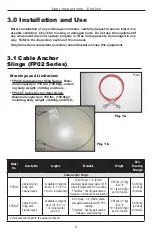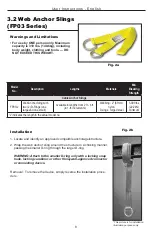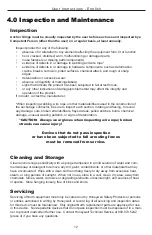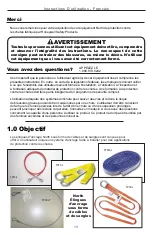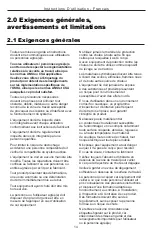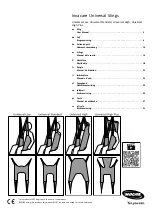
User Instructions - English
4
Never use fall protection equipment for
purposes other than those for which it was
designed. Fall protection equipment should
never be used for towing or hoisting.
All synthetic material must be protected from
slag, hot sparks, open flames, or other heat
sources.
Equipment must not be exposed to
environmental hazards and chemicals which
may produce a harmful effect.
Use in a corrosive or caustic environment
dictates a more frequent inspection and
servicing program to ensure the integrity of
the product is maintained.
Do not allow equipment to come in contact
with anything that will damage it including, but
not limited to, sharp, abrasive, rough or high-
temperature surfaces, welding, heat sources,
electrical hazards, or moving machinery.
Do not expose the equipment to any hazard
which it is not designed to withstand. Consult
the manufacturer in cases of doubt.
Always check for obstructions below the work
area to make sure potential fall path is clear.
Allow adequate fall clearance below the work
surface.
The purchaser of this equipment must ensure
that all personnel using this equipment
are familiar with these instructions and are
properly trained in the operation, limitations,
installation, inspection and maintenance of
this product. Training should be conducted
periodically and without exposing the trainee
to a fall hazard.
Never remove product labels, which include
important warnings and information for the
authorized person/user.
All warnings and instructions shall be
provided to authorized persons/users.
All authorized persons/users must reference
the regulations governing occupational
safety, as well as applicable ANSI or
CSA standards. Please refer to product
labeling for information on specific OSHA
regulations, and ANSI and CSA standards
met by product.
Proper precautions should always be taken
to remove any obstructions, debris, material,
or other recognized hazards from the work
area that could cause injuries or interfere
with the operation of the system.
All equipment must be inspected before
each use according to the manufacturer’s
instructions.
All equipment should be inspected by a
qualified person on a regular basis.
To minimize the potential for accidental
disengagement, a competent person must
ensure system compatibility.
Equipment must not be altered in any
way. Repairs must be performed only by
the manufacturer, or persons or entities
authorized in writing by the manufacturer.
Any product exhibiting deformities, unusual
wear, or deterioration must be immediately
discarded.
Any equipment subject to a fall must be
removed from service.
The authorized person/user shall have
a rescue plan and the means at hand to
implement it when using this equipment.
2.0 General Requirements,
Warnings and Limitations
2.1 General Requirements






